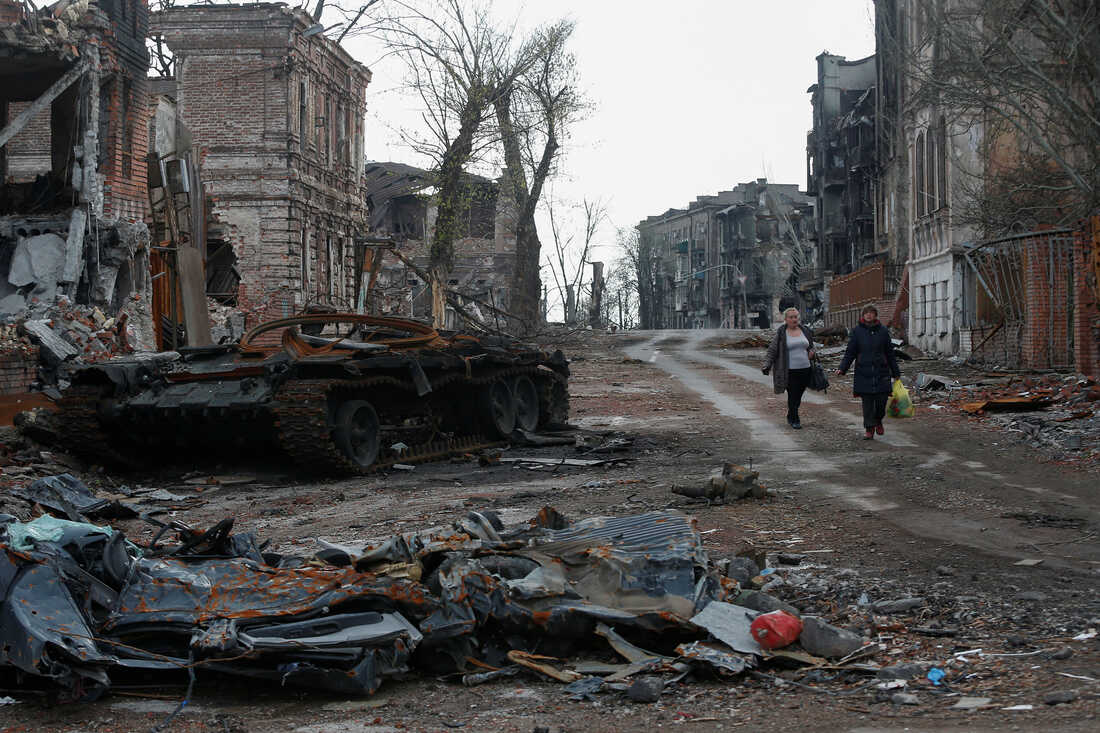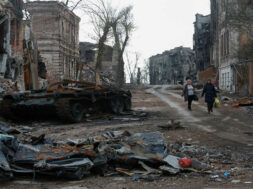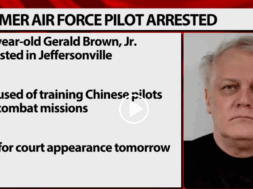
Russia Hits Oil Refinery and Military Installations in Ukraine
Manas Dasgupta
NEW DELHI, April 25: Russia on Monday struck Ukraine’s Kremenchuk oil refinery with long-range missiles and also hit military installations there, even as its defence ministry announced a ceasefire around the Azovstal steel plant in Mariupol to allow a civilian evacuation from the industrial area that has been sheltering the remaining Ukrainian resistance in the port city.
The defence ministry said the Russian troops “from 14:00 Moscow time (1100 GMT) on April 25, 2022, will unilaterally stop any hostilities, withdraw units to a safe distance and ensure the withdrawal of civilians.” It said the civilians would be taken “in any direction they have chosen”.
It added that the Ukrainian side should show “readiness” to start the humanitarian evacuations “by raising white flags” at Azovstal.
According to the ministry, this information will be communicated to those inside Azovstal “via radio channels” every 30 minutes. Russia last week said it had gained full control of the strategic eastern Ukrainian city, except for its huge Azovstal industrial area where the Ukrainian soldiers are holding out and provide shelter to hundreds of civilians. President Vladimir Putin ordered a blockade of the steelworks, where hundreds of civilians are reportedly sheltering with Ukrainian troops and ordered against storming the unit till the civilians were evacuated.
Ukraine, however, said Moscow had not agreed to its request for a humanitarian corridor to let wounded soldiers and civilians leave the Azovstal steel plant in the besieged port city of Mariupol. “Unfortunately, there are no agreements on humanitarian corridors from Azovstal today,” Deputy Prime Minister Iryna Vershchuk said on Telegram.
The Russian defence ministry reported. “The armed forces of the Russian Federation continue the special military operation in Ukraine.” Russia fired rockets at two towns in Ukraine’s central Vinnytsia region on Monday, causing an unspecified number of deaths and injuries, regional Governor Serhiy Borzov reported. “Today, Vinnytsia region is once again under rocket fire (in) the towns of Zhmerynka and Kozyatyn. The enemy is attempting to hit critical infrastructure,” Borzov said in a video released on the Telegram messaging app. Russia did not immediately comment on his remarks.
A day after his visit to Kyiv, US Secretary of State Antony Blinken on Monday stated that Russia was failing in its war aims and Ukraine was succeeding. Along with Defence Secretary Lloyd Austin, Blinken met President Volodymyr Zelensky and announced that the US would provide a total of $713 million in foreign military financing for Ukraine and 15 other partner countries, of which some $322 million is earmarked for Kyiv.
However, Moscow’s ambassador to Washington, Anatoly Antonov, in an interview with a state media channel said Russia had warned the US against sending more arms to Ukraine, calling it “unacceptable” and demanding an “end to this practice.” An official diplomatic note had been sent to Washington expressing Russia’s concerns, he said.
“In Europe, we see Russia’s aggression as direct threat to our security. We’ll make sure that unprovoked-unjustified aggression against Ukraine will be a strategic failure. Doing all we can to help Ukraine fight for its freedom. We imposed effective sanctions,” European Commission President Ursula von der Leyen said. She said the core principles that underline peace and security across the world were at stake. “We all see rising challenges to our open & free societies. This is true for the technological and the economic domain. But it’s also true for security. The reality is that the core principles that underpin peace and security across the world are at stake,” she said.
Meanwhile, a study report quoted in media said dozens of civilians in Bucha town, which had witnessed one of the worst of destructions during the Russian occupation of the city, had died by tiny metallic arrows. These have reportedly come from shells of a type of Russian Artillery. Many witnesses have reported that these tiny arrows, called fléchette rounds, were fired by Russian artillery forces before they withdrew from the city. While the human rights groups all over the globe have campaigned against fléchette shells, they are not banned according to international law.
Several coroners, while carrying out post-mortems for the civilians killed in Bucha, noted that small metal darts were found embedded in people’s chests and skulls. Ukrainian forensic doctor Vladyslav Pirovskyi said, “We found several really thin, nail-like objects in the bodies of men and women and so did others of my colleagues in the region…It is very hard to find those in the body, they are too thin. The majority of these bodies come from the Bucha-Irpin region.”
The experts said these resembled with anti-personnel weapons widely used during the First World War. A large number of fléchettes which are 3 to 4 centimetres in length are contained in field gun shells. When fired, these shells explode and detonate above ground which causes them to disperse in a wide arch covering an area of 300 meters wide and 100 meters long. Bucha was one of the worst-affected cities by the Russian invasion. After the Russian troops left the region to regroup for a fresh assault, Ukrainians found mass graves. A UN rights monitoring mission, which visited the city near Kyiv, said that 50 civilians had been killed there, including by summary execution while Ukraine claimed to have founds ‘hundreds of bodies in mass graves” after the Russian withdrawal.














